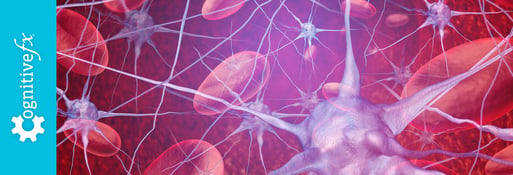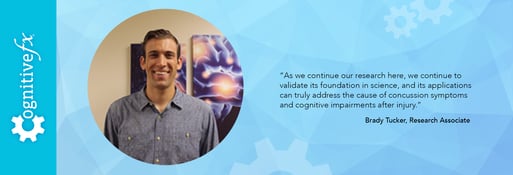4 Ways to Have an Injury Free Halloween
It’s getting to be that time when children’s obsession with all things strange and maybe slightly scary is reaching an all-time high. They are picking out costumes, eagerly awaiting the sugar high...
Published peer-reviewed research shows that Cognitive FX treatment leads to meaningful symptom reduction in post-concussion symptoms for 77% of study participants. Cognitive FX is the only PCS clinic with third-party validated treatment outcomes.
READ FULL STUDY
Benjamin Wing is our Research Associate Director here at Cognitive FX.
As an undergraduate at BYU–Hawaii, Benjamin graduated Summa Cum Laude with a Bachelor of Science in Biochemistry. Shortly thereafter, he continued his education, pursuing a Master of Science at University College London in Clinical Neuroscience. Benjamin will be beginning medical school in January, with hopes of specializing in Pediatric Neurology.
As our Research Associate Director, Benjamin assists Dr. Allen and Dr. Fong with data organization and analysis. Additionally, he directs our Research Division of Neurocognitive Imaging and Rehabilitation (RDNIR) in publishing scientific abstracts, research summaries, and full-length papers. Benjamin does a lot to help our team behind the scenes as we continue to expand our understanding of the brain and discover ways we can continue to influence positive changes in brain functioning. We asked Ben a few questions about his experience here at Cognitive FX as part of our team.
Why Clinical Neurology?
“For as long as I can remember I have had a strong interest in the brain. I’ve always been fascinated by its complexity and undiscovered secrets. Through my academic career, I came to realize that this interest could be bridged with my unique skill set in the world of Neuroscience. Of course, my dad, who is a physician, encouraged me to become a doctor, but the real draw for me to pursue Clinical Neurology is the face-to-face interaction with people. That is what ultimately led me to the more clinical side of Neurology instead of strictly research.”
What led you to Cognitive FX?
“Upon completing my Master’s degree, I returned home to Utah in search of a job until I could continue the pursuit of my dreams to attend medical school. While looking for jobs, my sister remembered that Dr. Fong, a neighbor and friend, worked in a field involving the brain, and asked if she knew of anyone looking to hire someone with my experience. Ironically, Dr. Fong and Dr. Allen were searching for someone with my particular resume to help with their research at Cognitive FX. So I came on as the Research Associate Director, charged with organizing patient information and research data, running statistical analyses, and writing publications. Now that we have an organized patient database, I have focused my efforts on publishing our research findings so the world can learn of the incredible science and results we have seen here at Cognitive FX.”
How much does research play a role in what we do in the clinic?
“Research drives everything we do! It drives our neurocognitive assessment and neurorehabilitative approach. Recent research has alluded to an imbalance between neurovascular activity and metabolic demand in mTBI. Put simply, in the brain there is a connection between cerebral blood flow and the energy we need to perform cognitive functions. This recent discovery becomes significant because, in more subjective brain injuries such as mTBI, we typically don’t find any structural evidence of damage on brain scans. Yet we know from conventional self-report pain surveys that concussed individuals have obtained some sort of damage, which lead to their persistent negative symptoms.
At Cognitive FX, we draw upon this knowledge of what we call Neurovascular Uncoupling (NVU), and, through extensive pre-testing, have found a way to objectively measure both the severity and localization of that imbalance. This gives us the ability to focus a treatment program that addresses dysfunction unique to each patient, with aims to restore that balance. Ultimately, research has not only driven our understanding of mTBI and its symptoms, it directs our individualized neurorehabilitation programs, and continues to support the establishment of this effective neurocognitive assessment protocol.”
Why Cognitive FX?
“Throughout my entire scientific career, I have been taught to be a skeptic. And, quite frankly, as I started to run analyses on the data from Cognitive FX I was shocked by the statistical results. I began to see how significant of an improvement the patients were getting. At first I thought, ‘There is no way this can be right.’ But as I neared a patient sample of 100, then 200, and now 300, I continued to see the same incredible results. And considering that in the world of neuroscience, a sample size of 10-20 is often sufficient because of the rare impact of brain related trauma or disease, I quickly reached a point where I couldn’t continue to be skeptical anymore. I knew that Cognitive FX had found a phenomenal way to restore function and improve the quality of life for its patients.
Above all else, the value I find from working here is, all of a sudden, finding myself working in a position where I am able to use the skills I’ve gained through my education to improve the lives of actual people. And I can personally witness the difference it is making. This is why my role at Cognitive FX takes on even greater importance—to write and share what we have found through publication—because it opens up our ability to impact not just the individuals who come into our clinic but the world.”

The "Cognitive FX Team" is a collaborative ensemble of distinguished doctors, therapists, and practitioners. Our experts are pioneers in the field of neuroimaging and concussion treatment. With extensive experience and a strong commitment to patient care, our team excels in utilizing cutting-edge technologies, such as functional MRI (fMRI), to provide personalized diagnostic and treatment strategies. Our renowned professionals have published groundbreaking research, developed innovative neuroimaging biomarkers, and conducted thousands of individualized patient assessments. We take pride in our holistic approach to patient care, focusing on physical, cognitive, and emotional aspects of recovery. As leaders in the industry, the Cognitive FX Team is dedicated to advancing the science of concussion diagnosis and treatment to provide our patients with the highest level of care and support.

It’s getting to be that time when children’s obsession with all things strange and maybe slightly scary is reaching an all-time high. They are picking out costumes, eagerly awaiting the sugar high...

The new school year is just around the corner; kids are preparing for another year of learning, friendships, and experiences, and mothers are rejoicing everywhere! Whether it’s vocabulary tests,...

Neuro refers to brain cells, also known as Neurons; Vascular means the blood supply or blood flow which is the same as the vascular system; and Coupling means connection. NeuroVascular Coupling (NVC)...
.png?height=175&name=Differences%20Between%20Post-Concussion%20Syndrome%20PCS%20%26%20Chronic%20Trauma%20Encephalopathy%20(CTE).png)
A concussion is a traumatic brain injury (TBI) which is caused by the brain hitting the skull. This can happen in sports, car accidents, falling, or anything similar. A concussion can even be the...

Brady Tucker is a Research Associate here at Cognitive FX.

After decades of research, Cognitive FX, in collaboration with Notus Neuropsychological Imaging, found the secret to understanding and recovering from a concussion: NeuroVascular Coupling (NVC). NVC...
Published peer-reviewed research shows that Cognitive FX treatment leads to meaningful symptom reduction in post-concussion symptoms for 77% of study participants. Cognitive FX is the only PCS clinic with third-party validated treatment outcomes.
READ FULL STUDY